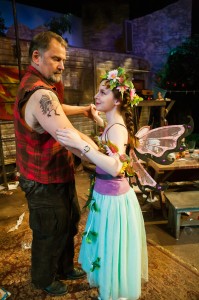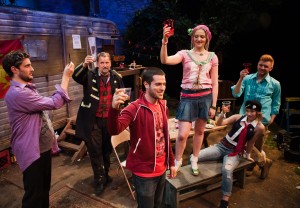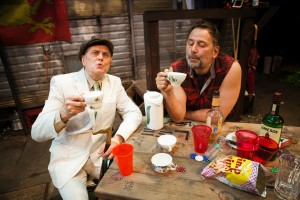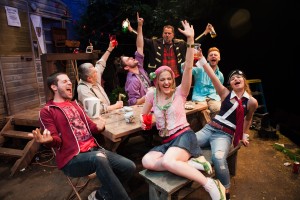PATOIS, DIALECTS AND DELIVERY LEAVE US IN THE WOODS
Jez Butterworth’s Jerusalem, currently making a West coast premiere at San Francisco Playhouse, presents a darkly comic tale from the fringes of society, involving squatters and dope-taking teenagers who are up against soulless cogs in the local government’s bureaucratic wheel. Director Bill English’s ambitious production is a beautiful and defiant celebration of freedom which regrettably gets a little lost in translation to an American audience.
 Floodlit by Kurt Landisman in blues and greens, the opening scene begins with blaring techno music, which foreshadows Butterworth’s leitmotif: “The wild green time is upon us!” English’s praiseworthy set design consists of a rundown trailer in the woods of the rural English countryside. This “gypsy caravan” is set against a bruised, dawn-lit morning, revealing a forest floor strewn with litter, the squalid aftermath of a wino’s campsite. But the lilting song of a May queen fairy, along with the surrounding forest greenery, and visual references to the symbols of royal England, gives the us the frisson of understanding that this green land, this England of William Blake and Shakespeare, of Arthurian legend and Druid magic, however marred, is still a force of wild, reckless magic.
Floodlit by Kurt Landisman in blues and greens, the opening scene begins with blaring techno music, which foreshadows Butterworth’s leitmotif: “The wild green time is upon us!” English’s praiseworthy set design consists of a rundown trailer in the woods of the rural English countryside. This “gypsy caravan” is set against a bruised, dawn-lit morning, revealing a forest floor strewn with litter, the squalid aftermath of a wino’s campsite. But the lilting song of a May queen fairy, along with the surrounding forest greenery, and visual references to the symbols of royal England, gives the us the frisson of understanding that this green land, this England of William Blake and Shakespeare, of Arthurian legend and Druid magic, however marred, is still a force of wild, reckless magic.
Jerusalem is both a hymn to the old England of lore and a lament for the modern world that is screwing things up. Butterworth’s play speaks to an audience hungry for meaning, grappling with the great mysteries of life (Why are we here? What is life for?) but in this production, such mythopoeic soul-searching does not translate terribly well to its new world audience.
 The Lewis Carroll–like script is threaded with twisted puns, naughty words, and English colloquialisms, cumulatively making rich use of the metaphoric power of the English vernacular. The result is a sound wonderful to the ear even as it’s hard going to comprehend. This is a defiantly British production that makes no allowances for unfamiliar audiences. A couple in front of me kept asking each other what “whizz,” “slapper,” “wangers,” and “pillock” could possibly mean (I’ll leave it to the imagination). While English helpfully provides a multipage glossary of terms and references in the program, it is impossible to refer to it in the midst of the play, and it proved difficult to wrestle with these eccentric forms of the English language–an issue that is compounded by the multiplicity of British accents (dialect coaching by Deborah Sussel and Jessica Berman). (It’s uncertain if the actors speaking slower or sticking to one type of dialect may have helped.) Although Jerusalem showcases England’s love for a fantastical paradise, it can and often did leave this Bay Area audience flummoxed.
The Lewis Carroll–like script is threaded with twisted puns, naughty words, and English colloquialisms, cumulatively making rich use of the metaphoric power of the English vernacular. The result is a sound wonderful to the ear even as it’s hard going to comprehend. This is a defiantly British production that makes no allowances for unfamiliar audiences. A couple in front of me kept asking each other what “whizz,” “slapper,” “wangers,” and “pillock” could possibly mean (I’ll leave it to the imagination). While English helpfully provides a multipage glossary of terms and references in the program, it is impossible to refer to it in the midst of the play, and it proved difficult to wrestle with these eccentric forms of the English language–an issue that is compounded by the multiplicity of British accents (dialect coaching by Deborah Sussel and Jessica Berman). (It’s uncertain if the actors speaking slower or sticking to one type of dialect may have helped.) Although Jerusalem showcases England’s love for a fantastical paradise, it can and often did leave this Bay Area audience flummoxed.
Veteran British stage actor Mark Rylance brought Jerusalem’s main character, gypsy wild man John Rooster Byron, to life in London’s West End in 2009 and again on Broadway in 2011, garnering rave reviews. Filling Rylance’s shoes is a tall order, and it is not clear that the undeniably talented and sexy Brian Dykstra  completely carries it off. Hung over and defiant, Dykstra’s Byron tells amazing stories of meeting giants on the highway with the relish of a natural charmer.
completely carries it off. Hung over and defiant, Dykstra’s Byron tells amazing stories of meeting giants on the highway with the relish of a natural charmer.
Operating under the Public Health Act, pollution control and “unauthorized encampment policy,” police officers come to post an eviction notice to oust him. “Mr. Byron, “ they prophetically call out “would you like to step outside and face the music?” For most of the play, Dykstra does just that, swaggering about his woodland grove like a King Lear figure. He is the Romantic hero in the woods at the tattered edge of modern development. Yet by the end of the night, whether through Dykstra’s dissipating energy or certain comic facets of the script that he may not have fully exploited, his rendition becomes tired, with Dykstra’s John Byron coming off less a hero than an aging, sad loser.
Richard Lewis James as the professor, Ian Scott McGregor as wannabe DJ, Ginger, Paris Hunter Paul as Lee and Joshua Schnell as the treacherous Davey, all give strong performances, but none memorable enough to make the difference. Maggie Mason as Dawn, Byron’s anguished ex-girlfriend and mother to his child, is surprisingly compelling; her chemistry with Bryon brings out a side of him we previously did not see. Some of the other women in the cast, including Julia Belanoff as Phaedra, Devon Simpson as Pea and Courtney Walsh as Fawcett, come off as inconsequential.
Jerusalem clearly hit a chord with audiences worldwide. The play has become a contemporary classic. But in this production, Butterworth’s eloquent script feels long and repetitive. The attempt to plunk a Romantic hero into the English woods and have him speak for all of us fails. Yet a certain existential weariness is one of the points of Butterworth’s play: “The world turns and moves on and you’re still fucking here!”
Jerusalem is layered with poetry and heart-breakingly beautiful ideas. While this production lacks forward momentum, with each act having a static nature that suggests that it could function independently from the others, its strength lies in its conviction that we all live in a kind of wood; that the wild man, that indigenous redemptive force of nature, beats within every one of us.
photos by Jessica Palopoli
Jerusalem
San Francisco Playhouse
Kensington Park Hotel at 450 Post Street
scheduled to end on March 8, 2014
for tickets, call (415) 677-9596 or visit www.SFPlayhouse.org




